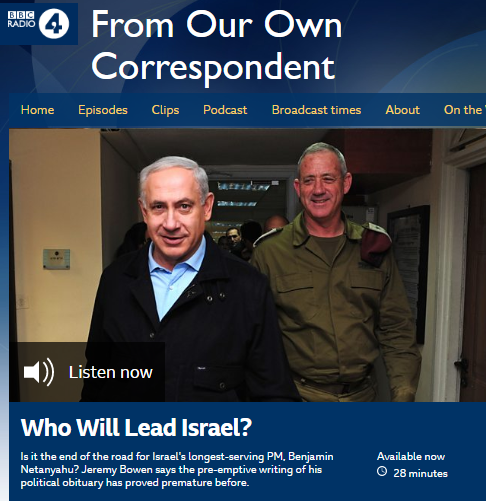The September 26th edition of BBC Radio 4’s ‘From Our Own Correspondent’ was titled “Who Will Lead Israel?” and the synopsis to the programme’s lead item reads as follows:
“Last week’s general election in Israel produced an indecisive result, but President Rivlin has asked Prime Minister Benjamin Netanyahu to form the country’s next government, after Mr Netanyahu and his main political opponent Benny Gantz failed to agree a deal on a unity government.
Many observers suggested this election would be the end of an era for Israel’s longest-serving PM, but as the BBC’s Middle East Editor Jeremy Bowen points out, the pre-emptive writing of Mr Netanyahu’s political obituary has proved premature before.”
That synopsis resembles the introduction given (from 00:23) by presenter Kate Adie. Listeners then heard the BBC Middle East editor’s reminiscences from Israeli elections in 1996 and 1999, with Jeremy Bowen providing a crude and unhelpful caricature of Israeli politics:
“In Israel, the more opposed you are to concessions to the Palestinians, the more Right-wing you are and vice-versa.”
Later on in his monologue, listeners were told that: [emphasis in italics in the original]
“He [Netanyahu] will repeat his conviction that he is the only man who can protect Israelis against Iran and its allies and against the Palestinians – both those in the West Bank, including East Jerusalem, and Gaza and the Palestinians who make up around 20% of Israel’s population.”
Not only did Jeremy Bowen continue to amplify his new narrative defining Arab-Israelis as Palestinians regardless of how they self-identify but Palestinian terrorism – the reason why Israelis require ‘protection’ – was whitewashed from the Middle East editor’s simplistic analysis.
Radio 4 listeners also heard the following claim (from 04:32) from the man tasked with providing “analysis that might make a complex story more comprehensive or comprehensible for the audience”.
“Netanyahu has a compelling reason to stay in office. He faces serious allegations of corruption, which he denies. They’re due to come to court next month.” [emphasis added]
That, however, is not the case: “next month” – i.e. October 2019 – pre-indictment hearings before the attorney general will take place over four working days commencing on October 2nd. As the Times of Israel notes:
“The hearings, which will see Netanyahu’s lawyers argue his conduct was entirely proper and within the boundaries of the law, will stretch over four days and wrap up before the start of the Yom Kippur fast on Tuesday evening.
Prosecution officials told Channel 12 news on Tuesday they hoped to reach a final decision on whether to indict the premier by the end of the year.”
In other words, Bowen’s claim that allegations against Netanyahu will “come to court next month” is inaccurate and misleading to audiences both from the point of view of the time frame presented and with regard to the implication that indictments have already been made. Any potential indictment is dependent upon the outcome of the ongoing hearings and as we see above, that process will take time.
One would of course expect the BBC’s main gatekeeper of Middle East news to be sufficiently familiar with the story so as to avoid making such a “pre-emptive” and “premature” false claim.
Related Articles:
Israeli election coverage continues to advance a new narrative




